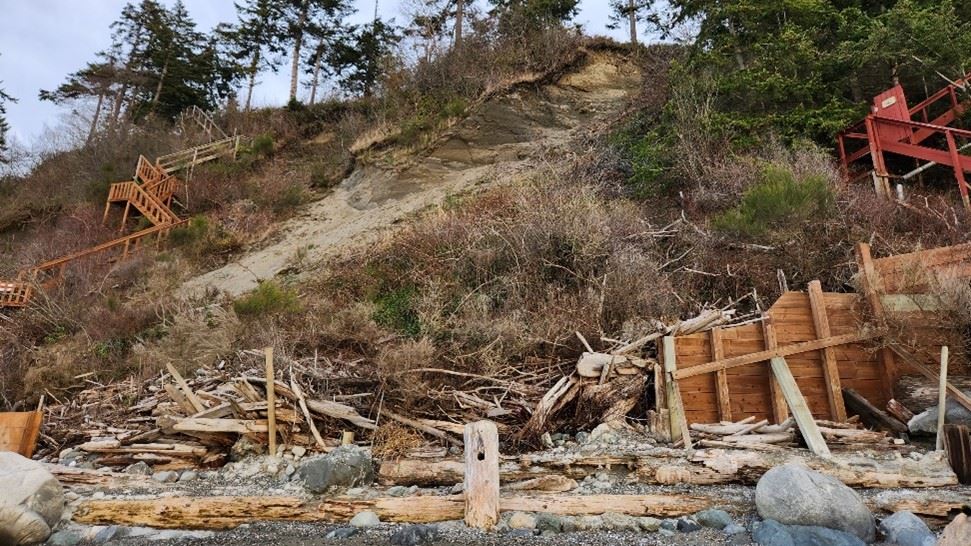 This course examines how to determine which type of erosion protection and shoreline treatment is applicable for a given site, as no one design is applicable everywhere. It will cover the preparation and review of the site-specific alternatives analysis for shoreline stabilization, including an evaluation of where alternatives to bulkheads are appropriate. The information in this course builds upon the information identified and included in the Site Assessment course #3. This course will also address the application review perspective of a local jurisdiction, including the concept of “demonstration of need,” as required in shoreline master programs, and how emergency situations are addressed. The risk assessment tool (as revised), provided in the Marine Shoreline Design Guidelines (MSDG), will be discussed as a basis for determining need (5 AICP CM Credits/CEP Points).
This course examines how to determine which type of erosion protection and shoreline treatment is applicable for a given site, as no one design is applicable everywhere. It will cover the preparation and review of the site-specific alternatives analysis for shoreline stabilization, including an evaluation of where alternatives to bulkheads are appropriate. The information in this course builds upon the information identified and included in the Site Assessment course #3. This course will also address the application review perspective of a local jurisdiction, including the concept of “demonstration of need,” as required in shoreline master programs, and how emergency situations are addressed. The risk assessment tool (as revised), provided in the Marine Shoreline Design Guidelines (MSDG), will be discussed as a basis for determining need (5 AICP CM Credits/CEP Points).
The Alternative to Bulkheads courses are endorsed by the Shore Friendly program and the content is consistent with Shore Friendly recommended practices. Participation in the training program does not indicate any form of endorsement of attendees by the Shore Friendly program, nor does participation assume subsequent work conducted by a participant adheres to Shore Friendly principles. Funded wholly or in part by EPA under grant #PC-01J22301 (NEP Habitat Strategic Initiative).
Please reach out to Sara Brostrom (bros461@ecy.wa.gov) if you require an accommodation for this training (audio, visual, mobility, or other). Additionally, we can offer a couple of scholarship to cover the registration fees with each training. Please reach out if you need a scholarship in order to participate in the training.
Instructors
Jessica Cote is a coastal engineer with Blue Coast Engineering, which she founded in 2018. Jessica is deeply committed to the health and recovery of Puget Sound. For more than two decades she has worked on complex coastal issues nationally and globally. She received her Master’s degree in Ocean Engineering from Oregon State University.
Corey Morss is an Environmental Engineer working for the Washington Department of Fish and Wildlife Habitat Program. He provides technical assistance to WDFW Habitat Biologists statewide, as well as designing and constructing restoration projects in marine and freshwater environments. Corey has developed and delivered trainings on water crossings, marine shoreline protection (MSDG), fluvial geomorphology, reading engineering plans, and fish friendly construction considerations.
Sydney Fishman is the Coastal Management Specialist at Washington Sea Grant, where she helps shoreline and coastal decision-makers find solutions to their complex management issues. Her work spans the broad areas of shoreline management, shoreline stabilization, and coastal climate resilience. She supports regional efforts to address shoreline armoring and improve the health of Puget Sound shorelines. A goal of her work is to increase the use of soft shore methods and other alternatives to hard shoreline armoring, and to encourage the removal of hard armoring where possible. She holds a Master of Environmental Management degree from Duke University.
Dave Risvold is an Environmental Biologist with the Land Use and Environmental Review division of Pierce County Planning and Public Works, a position he has held for 26 years. He has a BS in Biology with Marine Emphasis, and a Masters degree in Public Administration. In addition to development project review and code enforcement, he has been involved in County code updates related to critical fish species listings, a comprehensive update to the County Critical Areas Ordinance, and the first major update to its Shoreline Master Program to occur since its adoption in the mid-70’s. For the last six – seven years, Dave has overseen implementation of the Shoreline Master Program that became effective in October, 2018.
